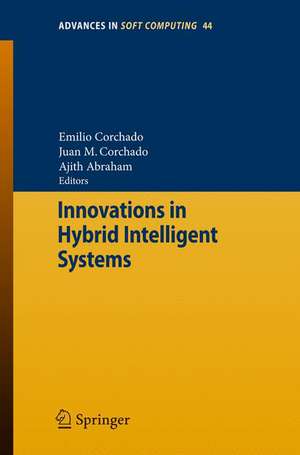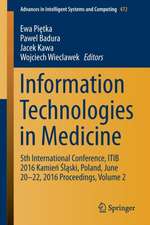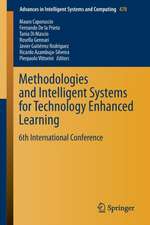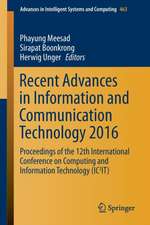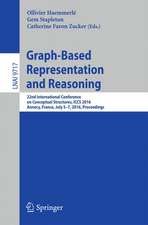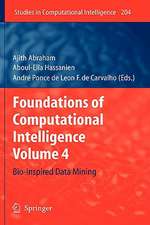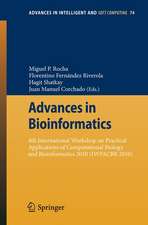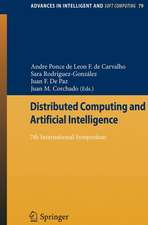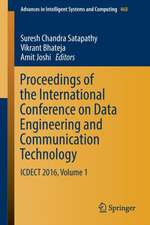Innovations in Hybrid Intelligent Systems: Advances in Intelligent and Soft Computing, cartea 44
Editat de Emilio Corchado, Juan Manuel Corchado Rodríguez, Ajith Abrahamen Limba Engleză Paperback – 6 noi 2007
Din seria Advances in Intelligent and Soft Computing
- 18%
 Preț: 2813.03 lei
Preț: 2813.03 lei - 20%
 Preț: 1273.74 lei
Preț: 1273.74 lei - 18%
 Preț: 1214.72 lei
Preț: 1214.72 lei - 18%
 Preț: 1221.07 lei
Preț: 1221.07 lei - 20%
 Preț: 653.06 lei
Preț: 653.06 lei - 20%
 Preț: 1919.02 lei
Preț: 1919.02 lei - 20%
 Preț: 984.04 lei
Preț: 984.04 lei - 20%
 Preț: 1746.09 lei
Preț: 1746.09 lei - 20%
 Preț: 1906.99 lei
Preț: 1906.99 lei - 20%
 Preț: 1763.75 lei
Preț: 1763.75 lei - 20%
 Preț: 1278.68 lei
Preț: 1278.68 lei - 20%
 Preț: 1926.61 lei
Preț: 1926.61 lei - 20%
 Preț: 3183.20 lei
Preț: 3183.20 lei - 20%
 Preț: 334.86 lei
Preț: 334.86 lei - 20%
 Preț: 1916.55 lei
Preț: 1916.55 lei - 20%
 Preț: 981.25 lei
Preț: 981.25 lei - 20%
 Preț: 1934.70 lei
Preț: 1934.70 lei - 20%
 Preț: 1932.07 lei
Preț: 1932.07 lei - 20%
 Preț: 979.71 lei
Preț: 979.71 lei - 20%
 Preț: 1920.84 lei
Preț: 1920.84 lei - 15%
 Preț: 647.92 lei
Preț: 647.92 lei - 20%
 Preț: 985.86 lei
Preț: 985.86 lei - 20%
 Preț: 641.16 lei
Preț: 641.16 lei - 20%
 Preț: 3174.14 lei
Preț: 3174.14 lei - 20%
 Preț: 1293.71 lei
Preț: 1293.71 lei - 20%
 Preț: 2890.01 lei
Preț: 2890.01 lei - 20%
 Preț: 1924.15 lei
Preț: 1924.15 lei - 20%
 Preț: 1901.71 lei
Preț: 1901.71 lei - 20%
 Preț: 1934.70 lei
Preț: 1934.70 lei - 20%
 Preț: 1918.04 lei
Preț: 1918.04 lei - 20%
 Preț: 1919.02 lei
Preț: 1919.02 lei - 20%
 Preț: 419.25 lei
Preț: 419.25 lei - 20%
 Preț: 1310.68 lei
Preț: 1310.68 lei - 20%
 Preț: 1931.42 lei
Preț: 1931.42 lei - 20%
 Preț: 1941.96 lei
Preț: 1941.96 lei - 20%
 Preț: 2217.66 lei
Preț: 2217.66 lei - 20%
 Preț: 1297.17 lei
Preț: 1297.17 lei - 20%
 Preț: 1295.71 lei
Preț: 1295.71 lei - 20%
 Preț: 1306.07 lei
Preț: 1306.07 lei - 20%
 Preț: 1277.06 lei
Preț: 1277.06 lei - 20%
 Preț: 1909.64 lei
Preț: 1909.64 lei - 20%
 Preț: 668.07 lei
Preț: 668.07 lei
Preț: 1283.96 lei
Preț vechi: 1604.96 lei
-20% Nou
Puncte Express: 1926
Preț estimativ în valută:
245.72€ • 255.58$ • 202.85£
245.72€ • 255.58$ • 202.85£
Carte tipărită la comandă
Livrare economică 14-28 aprilie
Preluare comenzi: 021 569.72.76
Specificații
ISBN-13: 9783540749714
ISBN-10: 3540749713
Pagini: 518
Ilustrații: XVI, 498 p.
Dimensiuni: 155 x 235 x 32 mm
Greutate: 0.76 kg
Ediția:2007
Editura: Springer Berlin, Heidelberg
Colecția Springer
Seria Advances in Intelligent and Soft Computing
Locul publicării:Berlin, Heidelberg, Germany
ISBN-10: 3540749713
Pagini: 518
Ilustrații: XVI, 498 p.
Dimensiuni: 155 x 235 x 32 mm
Greutate: 0.76 kg
Ediția:2007
Editura: Springer Berlin, Heidelberg
Colecția Springer
Seria Advances in Intelligent and Soft Computing
Locul publicării:Berlin, Heidelberg, Germany
Public țintă
ResearchCuprins
Hybrid Artificial Intelligence Systems.- Hybrid Artificial Intelligence Systems.- Agents and Multiagent Systems.- Analysis of Emergent Properties in a Hybrid Bio-inspired Architecture for Cognitive Agents.- Using Semantic Causality Graphs to Validate MAS Models.- A Multiagent Framework to Animate Socially Intelligent Agents.- Context Aware Hybrid Agents on Automated Dynamic Environments.- Sensitive Stigmergic Agent Systems — A Hybrid Approach to Combinatorial Optimization.- Fuzzy Systems.- Agent-Based Social Modeling and Simulation with Fuzzy Sets.- Stage-Dependent Fuzzy-valued Loss Function in Two-Stage Binary Classifier.- A Feature Selection Method Using a Fuzzy Mutual Information Measure.- Interval Type-2 ANFIS.- A Vision-Based Hybrid Classifier for Weeds Detection in Precision Agriculture Through the Bayesian and Fuzzy k-Means Paradigms.- Artificial Neural Networks.- Development of Multi-output Neural Networks for Data Integration — A Case Study.- Combined Projection and Kernel Basis Functions for Classification in Evolutionary Neural Networks.- Modeling Heterogeneous Data Sets with Neural Networks.- A Computational Model of the Equivalence Class Formation Psychological Phenomenon.- Data Security Analysis Using Unsupervised Learning and Explanations.- Finding Optimal Model Parameters by Discrete Grid Search.- Clustering and Multiclassfier Systems.- A Hybrid Algorithm for Solving Clustering Problems.- Clustering Search Heuristic for the Capacitated p-Median Problem.- Experiments with Trained and Untrained Fusers.- Fusion of Visualization Induced SOM.- Robots.- Open Intelligent Robot Controller Based on Field-Bus and RTOS.- Evolutionary Controllers for Snake Robots Basic Movements.- Evolution of Neuro-controllers for Multi-link Robots.- Solving Linear DifferenceEquations by Means of Cellular Automata.- Metaheuristics and Optimization Models.- Automated Classification Tree Evolution Through Hybrid Metaheuristics.- Machine Learning to Analyze Migration Parameters in Parallel Genetic Algorithms.- Collaborative Evolutionary Swarm Optimization with a Gauss Chaotic Sequence Generator.- A New PSO Algorithm with Crossover Operator for Global Optimization Problems.- Solving Bin Packing Problem with a Hybridization of Hard Computing and Soft Computing.- Design of Artificial Neural Networks Based on Genetic Algorithms to Forecast Time Series.- Experimental Analysis for the Lennard-Jones Problem Solution.- Application of Genetic Algorithms to Strip Hot Rolling Scheduling.- Synergy of PSO and Bacterial Foraging Optimization — A Comparative Study on Numerical Benchmarks.- Artificial Vision.- Bayes-Based Relevance Feedback Method for CBIR.- A Novel Hierarchical Block Image Retrieval Scheme Based Invariant Features.- A New Unsupervised Hybrid Classifier for Natural Textures in Images.- Visual Texture Characterization of Recycled Paper Quality.- Case-Based Reasoning.- Combining Improved FYDPS Neural Networks and Case-Based Planning — A Case Study.- CBR Contributions to Argumentation in MAS.- Case-Base Maintenance in an Associative Memory Organized by a Self-Organization Map.- Hybrid Multi Agent-Neural Network Intrusion Detection with Mobile Visualization.- Learning Models.- Knowledge Extraction from Environmental Data Through a Cognitive Architecture.- A Model of Affective Entities for Effective Learning Environments.- Bioinformatics.- Image Restoration in Electron Cryotomography — Towards Cellular Ultrastructure at Molecular Level.- SeqTrim — A Validation and Trimming Tool for All Purpose Sequence Reads.- A Web Tool to DiscoverFull-Length Sequences — Full-Lengther.- Discovering the Intrinsic Dimensionality of BLOSUM Substitution Matrices Using Evolutionary MDS.- Autonomous FYDPS Neural Network-Based Planner Agent for Health Care in Geriatric Residences.- Structure-Preserving Noise Reduction in Biological Imaging.- Ensemble of Support Vector Machines to Improve the Cancer Class Prediction Based on the Gene Expression Profiles.- NATPRO-C13 — An Interactive Tool for the Structural Elucidation of Natural Compounds.- Application of Chemoinformatic Tools for the Analysis of Virtual Screening Studies of Tubulin Inhibitors.- Identification of Glaucoma Stages with Artificial Neural Networks Using Retinal Nerve Fibre Layer Analysis and Visual Field Parameters.- Dimensional Reduction in the Protein Secondary Structure Prediction — Nonlinear Method Improvements.- Other Applications.- Focused Crawling for Retrieving Chemical Information.- Optimal Portfolio Selection with Threshold in Stochastic Market.- Classification Based on Association Rules for Adaptive Web Systems.- Statistical Selection of Relevant Features to Classify Random, Scale Free and Exponential Networks.- Open Partner Grid Service Architecture in eBusiness.- An Architecture to Support Programming Algorithm Learning by Problem Solving.- Explain a Weblog Community.- Implementing Data Mining to Improve a Game Board Based on Cultural Algorithms.
Textul de pe ultima copertă
Hybrid Artificial Intelligence Systems (HAIS) combines symbolic and sub-symbolic techniques to construct more robust and reliable problem solving models. This volume focused on "Hybrid Artificial Intelligence Systems" contains a collection of papers that were presented at the 2nd International Workshop on Hybrid Artificial Intelligence Systems, held in 12 - 13 November, 2007, Salamanca, Spain. This carefully edited book provides a comprehensive overview of the recent advances in the hybrid intelligent systems and covers a wide range of application areas, including data analysis and data mining, intelligent control, pattern recognition, robotics, optimization, etc. The book is aimed at researchers, practitioners and postgraduate students who are engaged in developing and applying advanced intelligent systems principles to solving real-world problems.
Caracteristici
Proceedings of the Hybrid Artificial Intelligence Systems Workshop (HAIS 07 – CAEPIA 2007) Recent developments in Hybrid Intelligent Systems
